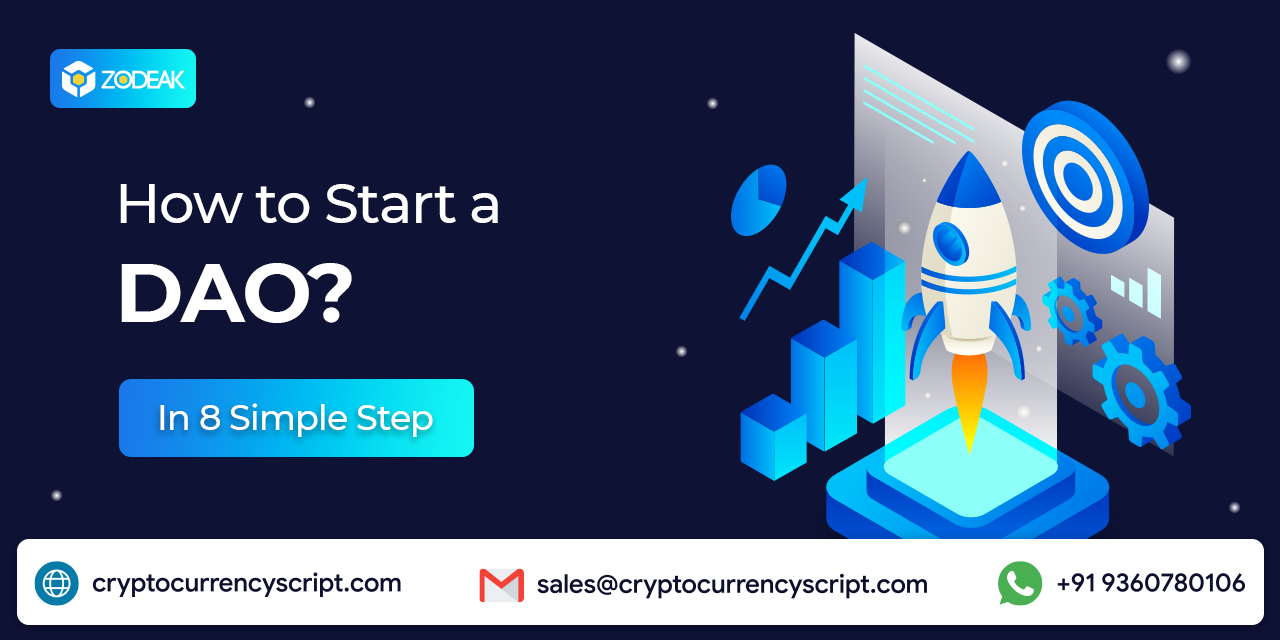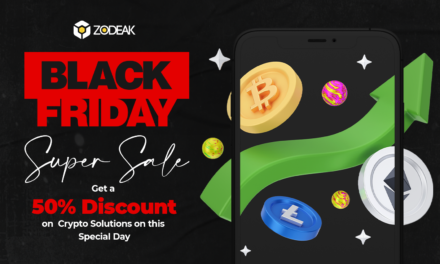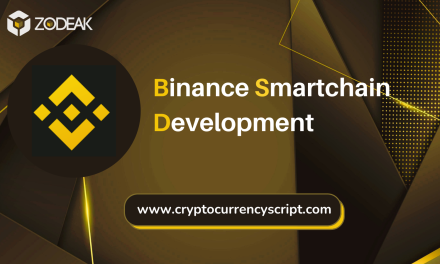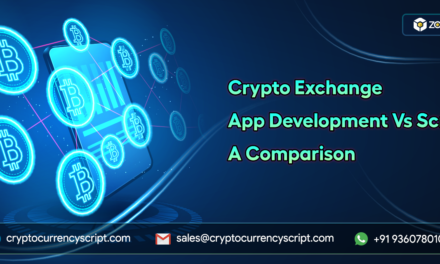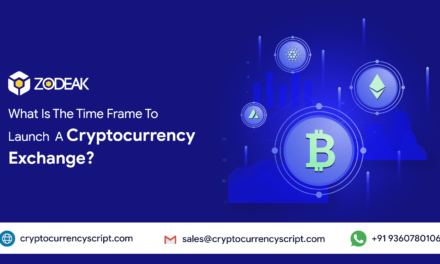Interested in knowing how to start a DAO? This article guides you through all the essential steps for the easy launch of your own DAO platform.
DAOs, represent a pivotal advancement in the digital business landscape, offering a fresh perspective on financial services for only the members of the centralized authority. Leveraging blockchain technology, DAOs establish decentralization, empowering members to collectively pursue common objectives. Despite the potential to create a DAO, it’s essential to grasp the fundamentals of DAOs. This post provides an introductory overview of DAOs along with the simple 8 steps for easy understanding.
What is DAO?
DAOs is an online community with shared financial resources, like a communal bank account. They exhibit diverse structures and objectives, ranging from open-source blockchain-based entities to those resembling traditional limited liability companies (LLCs), reflecting the unique vision and goals of each organization.
Harnessing smart contracts makes the organization autonomous. A DAO is constructed upon rules programmed into software, governing all facets of operation from financial transactions to task management. Prior to activation, unanimous agreement from every member regarding the code’s entirety is a must.
In a DAO, there is no central authority, decisions are made by the members of the organization. Changes are made depending on the voting process involving all members. The code will be revised only based on the votes received within that organization.
Note: DAO format won’t suit all business models. Some businesses need a hierarchical or semi-hierarchial model. So if your mission is to make transparent, secure, and democratic management. Then DAO operating on blockchain will be the right choice for you.
Next, coming back to the question: How to start a DAO?
Let’s see the answer to the question in simple steps.
How to start a DAO – Step-by-Step Guide
Step 1. Determine DAO’s purpose and goals
You must have a clear and precise vision for creating a DAO. Create a white paper that helps potential investors and partners review and understand the goals of the project.
Step 2. Define DAO’s tokenomics strategy
DAO operates on a robust tokenomics model designed to incentivize user and investor participation. You can generate revenue through various channels, including transaction fees, protocol usage fees, and strategic partnerships. Participation in the project’s financial activities, such as token distribution, contribution to liquidity pools, staking, lending, and more, is governed by transparent terms and conditions outlined in our DAO’s governance protocols. These protocols ensure fairness, security, and accountability for all participants, fostering a vibrant ecosystem built on trust and mutual benefit.
Step 3. Build a community
To foster community growth and steer the development of our newly created DAO, we are prioritizing the establishment of a strong presence across social media platforms like Twitter and Discord. Through targeted marketing and PR campaigns, we aim to amplify our reach and engage with a diverse audience. Early members will be rewarded with exclusive benefits, incentivizing their active participation and dedication to the DAO’s success, thus laying a solid foundation for sustained community expansion and collaborative development efforts.
Step 4. Specify the governance structure
Participation in the governance of our DAO is conducted through token-weighted voting, where each token owned equates to one vote. This ensures that users have a proportional say in decision-making based on their token holdings, aligning voting power with investment commitment. By empowering users with greater token ownership to influence governance decisions, we prioritize fairness and accountability while fostering a democratic environment conducive to collective decision-making and community-driven development.
Step 5. Define the type of DAO
Here, you have to state the kind of your DAO. You have to choose DAO according to your goals. The most common types of DAO are:
Protocol DAO grants holders the ability to propose amendments and participate in voting processes regarding the DAO’s operations and protocols, ensuring a democratic and inclusive decision-making framework.
Collector DAO unites enthusiasts of NFTs while providing creators with a platform to showcase ownership of their work.
Investment DAO serves as a transparent and universally accessible platform, facilitating capital raising for DeFi projects and startups.
Grant DAO empowers users to accumulate funds within the grant pool and participate in voting to allocate and distribute these resources.
Entertainment DAO empowers token creators to cultivate vibrant communities around their collections and allocate funds towards new projects, including play-to-earn games and metaverse activities, fostering innovation and engagement within the entertainment ecosystem.
Social DAOs bolster social networking within the crypto community and provide an open forum for unrestricted communication, idea-sharing, and fundraising. Membership in a social DAO typically requires owning a specific number of tokens or receiving a personal invitation.
Step 6. Build a DAO
Partnering with a team of seasoned blockchain consultants and developers will enable you to deploy a cutting-edge decentralized solution. They will assist in selecting an optimal blockchain platform to serve as the foundation for your DAO, advising on necessary network integrations and supporting crypto wallet compatibility. Additionally, they will develop robust and resilient smart contracts to ensure fault tolerance and swift execution within your ecosystem.
Step 7. Test a DAO
To ensure smooth operations and mitigate potential risks, conducting comprehensive testing is paramount. QA engineers’ meticulous attention to detail is indispensable in refining the system’s performance and upholding its integrity, safeguarding against hidden bugs that could compromise the user experience or pose threats to the platform.
Step 8. Deploy a DAO
Upon successful testing, releasing your DAO to the mainnet marks a significant milestone. However, it’s crucial to gather feedback from users to address concerns and preferences, enabling continuous improvement. Regular quality assurance testing remains essential to ensure the ongoing smooth functioning of the platform.
Conclusion
We have observed a significant paradigm shift in the financial landscape, marked by increasing interest in blockchain technology and a notable trend towards investing in decentralized DeFi projects over traditional centralized corporations.
So this will be a perfect opportunity to establish your own DAO, leveraging its potential to spotlight your blockchain-based project and cultivate a dedicated community.
Zodeak, DAO development company are ready to support you in every step of the DAO creation journey, offering expert guidance from idea validation to deployment. Don’t hesitate to reach out to us—we’re here to help you bring your decentralized vision to life.

